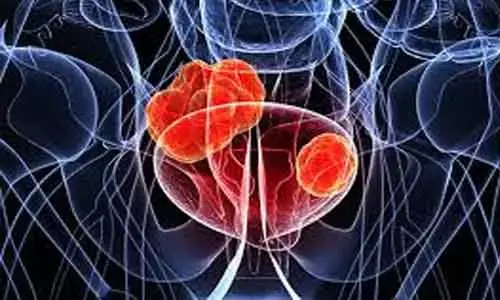- Home
- Medical news & Guidelines
- Anesthesiology
- Cardiology and CTVS
- Critical Care
- Dentistry
- Dermatology
- Diabetes and Endocrinology
- ENT
- Gastroenterology
- Medicine
- Nephrology
- Neurology
- Obstretics-Gynaecology
- Oncology
- Ophthalmology
- Orthopaedics
- Pediatrics-Neonatology
- Psychiatry
- Pulmonology
- Radiology
- Surgery
- Urology
- Laboratory Medicine
- Diet
- Nursing
- Paramedical
- Physiotherapy
- Health news
- Fact Check
- Bone Health Fact Check
- Brain Health Fact Check
- Cancer Related Fact Check
- Child Care Fact Check
- Dental and oral health fact check
- Diabetes and metabolic health fact check
- Diet and Nutrition Fact Check
- Eye and ENT Care Fact Check
- Fitness fact check
- Gut health fact check
- Heart health fact check
- Kidney health fact check
- Medical education fact check
- Men's health fact check
- Respiratory fact check
- Skin and hair care fact check
- Vaccine and Immunization fact check
- Women's health fact check
- AYUSH
- State News
- Andaman and Nicobar Islands
- Andhra Pradesh
- Arunachal Pradesh
- Assam
- Bihar
- Chandigarh
- Chattisgarh
- Dadra and Nagar Haveli
- Daman and Diu
- Delhi
- Goa
- Gujarat
- Haryana
- Himachal Pradesh
- Jammu & Kashmir
- Jharkhand
- Karnataka
- Kerala
- Ladakh
- Lakshadweep
- Madhya Pradesh
- Maharashtra
- Manipur
- Meghalaya
- Mizoram
- Nagaland
- Odisha
- Puducherry
- Punjab
- Rajasthan
- Sikkim
- Tamil Nadu
- Telangana
- Tripura
- Uttar Pradesh
- Uttrakhand
- West Bengal
- Medical Education
- Industry
Fortis Bengaluru doctor perform HIVEC procedure on 58 year old with bladder cancer

Bengaluru: A team of doctors at Fortis Hospitals, Bangalore successfully performed South India's first HIVEC (Hyperthermic Intra-Vesical Chemotherapy) technique on 58-year-old male suffering from bladder cancer. The procedure was performed by a team of experts led by Dr Mohan Keshavamurthy, Director Urology, Uro-oncology, Andrology, Transplant & Robotic Surgery, Fortis Hospitals, Bangalore.
HIVEC technology comes as a gold standard for patients of bladder cancer who are Bacillus Calmette Guerin (BCG) resistant. This procedure is a safe and effective option for high-grade cancer bladder who have recurrence despite intravesical BCG therapy. It is also useful for patients with muscle-invasive bladder cancer who want to preserve their bladder and avoid radical cystectomy. The patient underwent three sessions of HIVEC over a period of 20 days.
"Bladder cancer is one of the common urological cancers and its incidence seems to be increasing. In high grade or muscle-invasive cancer bladder, removal of the bladder is the treatment of choice that has a social and psychological impact on the patient. Also, there is a significant probability of cancer recurrences for patients with bladder cancer in the case of BCG therapy. With HIVEC, the chances of recurrences of cancer becomes minimal along with good success rates," said Dr Mohan Keshavamurthy- Director Urology, Uro-oncology, Andrology, Transplant & Robotic Surgery, Fortis Hospitals, Bangalore.
HIVEC treatment requires the use of a small machine that is called The COMBAT BRS system. This system is connected to the patient's catheter via a closed circuit of small tubes. The system warms the chemotherapy drug before it then enters the bladder through a special catheter. The chemotherapy drug is heated to a temperature of 43°C which is a similar temperature to that of a warm bath. It is then gently re-circulated around the bladder and back through the system up to 4 times a minute. This is to make sure that the whole area inside the bladder is kept at a constant target temperature of 43°C and that the chemotherapy drug is well distributed so the whole bladder is treated.
Recent evidence has shown that heating the chemotherapy drug when it is inside your bladder can help to increase its ability to kill cancer cells. This is because the heat allows the chemotherapy drug to be more easily absorbed into the bladder lining, allowing for deeper penetration into the bladder wall. The heat generated inside the bladder can also help to directly kill any remaining cancer cells, as well as increases the body's natural immune response which will also target the cancer cells and kill them.
Currently, high-grade bladder cancer in India is treated with BCG intravesical immunotherapy. However, a large proportion of patients experience a recurrence. If BCG becomes unresponsive, then a cystectomy (removal of the bladder) has to be performed. Some patients may not be considered for this option due to side effects. Approximately 50% of patients with bladder cancer develop recurrence after BCG therapy. HIVEC helps in bladder preservation strategy for such patients.
Hina Zahid Joined Medical Dialogue in 2017 with a passion to work as a Reporter. She coordinates with various national and international journals and association and covers all the stories related to Medical guidelines, Medical Journals, rare medical surgeries as well as all the updates in the medical field. Email: editorial@medicaldialogues.in. Contact no. 011-43720751
Dr Kamal Kant Kohli-MBBS, DTCD- a chest specialist with more than 30 years of practice and a flair for writing clinical articles, Dr Kamal Kant Kohli joined Medical Dialogues as a Chief Editor of Medical News. Besides writing articles, as an editor, he proofreads and verifies all the medical content published on Medical Dialogues including those coming from journals, studies,medical conferences,guidelines etc. Email: drkohli@medicaldialogues.in. Contact no. 011-43720751


